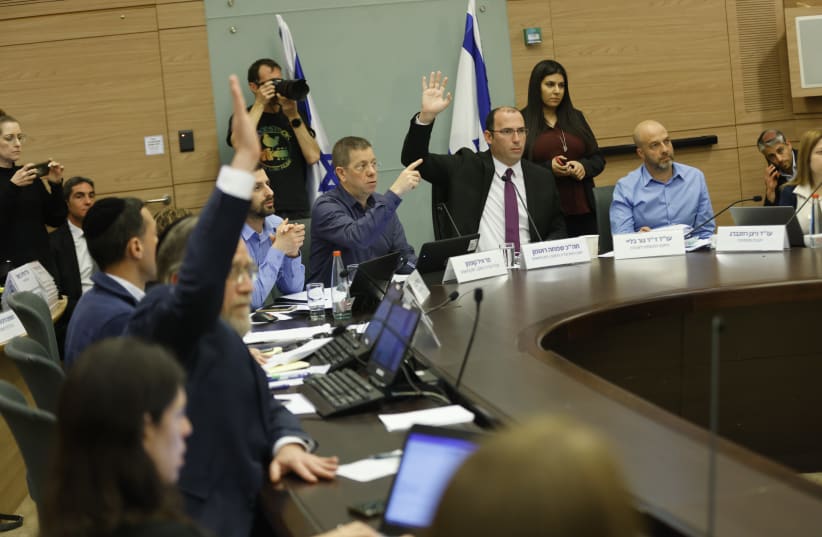New bill to control lawyer fees sparks accusations of government pressure on Israel Bar Association's judicial appointment vote.
By ELIAV BREUER NOVEMBER 20, 2024 19:47 MK Simcha Rotman, Head of the Constitution Committee, at a committee vote on the judicial reform legislation at the Knesset, the Israeli Parliament in Jerusalem on March 5, 2023.
(photo credit: ERIK MARMOR/FLASH90)
MK Simcha Rotman, Head of the Constitution Committee, at a committee vote on the judicial reform legislation at the Knesset, the Israeli Parliament in Jerusalem on March 5, 2023.
(photo credit: ERIK MARMOR/FLASH90)
Israel's Knesset Constitution Committee held a heated debate on Wednesday over a contested bill proposal that gives the Justice Minister the authority to set the amount of the annual membership fee for the Israel Bar Association (IBA) instead of IBA's national council, which currently enjoys that authority.
The bill's author, Likud MK Hanoch Milvitsky, along with committee chairman MK Simcha Rothman (Likud), argued that the IBA should not have the power to set a fee that lawyers were forced to pay in order to practice their profession. Milvitsky, Rothman, and other coalition MKs argued that the bill increased the freedom of occupation for lawyers, since it would lower membership fees.
The MKs also argued that the IBA should not use the funds for what the MKs claimed were political purposes, such as joining protests against the government's 2023 judicial reforms.
However, the Bar Association's chairman, Adv. Amit Becher, and a number of opposition MKs argued that the bill's real purpose was to serve a threat against the IBA, in order to attempt to force the IBA's two members in the Judicial Selection Committee to support Levin's candidate for the next High Court Chief Justice.
"The bill proposal is not intended to deal with lawyers' welfare or the size of membership fees, but part of a drive led by Justice Minister Yariv Levin to harm the independence of the judicial system, and weaken the Bar Association and harm its independence, and to terrorize the members of the IBA in the Judicial Selection Committee, so that they vote against [liberal judge and interim Chief Justice Yizhak] Amit.
Representatives of the justice minister threatened that if the IBA's representatives vote for Amit, they will pass a law to harm the IBA's budget," Becher said.
Heated exchanges
During the meeting, Milvitsky and Becher engaged in a number of heated exchanges, with Becher accusing Milvitsky of being a liar, and Milvitsky responding that Becher was a "lowly lobbyist." Rothman removed Becher from the debate three times.
The makeup of the Judicial Selection Committee has been a major bone of contention between the government and the opposition and judicial system, and one of the central bills in the judicial reforms was to alter its makeup such that the government could have indirect control over judicial appointments. Another bone of contention is the mechanism to appoint the Chief Justice.
Traditionally, the position is filled by the longest-serving member of the bench, who is currently Amit. Levin, however, prefers the conservative judge Yosef Elron, and has argued that the "seniority" method is not statutory and should not always apply.
The chief justice vote requires a regular majority within the nine-member selection. The committee includes three judges and two members of the IBA, and, along with the opposition representative MK Karine Elharrar, is expected to appoint Amit. However, an IBA vote alongside the coalition's three representatives would give Levin a majority.
Stay updated with the latest news!
Subscribe to The Jerusalem Post Newsletter
Levin has, therefore, refrained from convening the committee to appoint the next permanent chief justice or to fill the three current vacancies on the bench. The High Court ruled in September that Levin did not have the authority to avoid electing a chief justice and gave him 14 days to announce the candidates and an additional 45 days to convene the committee. A meeting is scheduled for November 28.
Levin announced on November 5 that the committee would convene on November 28, but it is not clear if a vote to appoint the chief justice will be held.

 By The Jerusalem Post (World News) | Created at 2024-11-20 18:15:06 | Updated at 2024-11-24 14:39:58
3 days ago
By The Jerusalem Post (World News) | Created at 2024-11-20 18:15:06 | Updated at 2024-11-24 14:39:58
3 days ago








